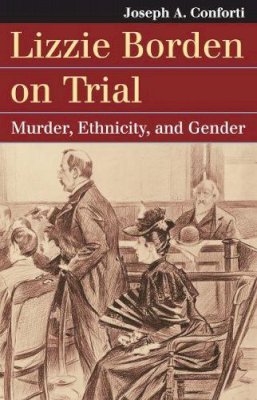
Stock image for illustration purposes only - book cover, edition or condition may vary.
Lizzie Borden on Trial: Murder, Ethnicity, and Gender
Joseph A. Conforti
€ 91.49
FREE Delivery in Ireland
Description for Lizzie Borden on Trial: Murder, Ethnicity, and Gender
Hardback. A new look at the famous Lizzie Borden murder case and how it turned into a 19th century media spectacle. Series: Landmark Law Cases and American Society. Num Pages: 256 pages. BIC Classification: 1KBBES; 3JH; BTC. Category: (G) General (US: Trade). Dimension: 203 x 140 x 22. Weight in Grams: 454.
Most people could probably tell you that Lizzie Borden “took an axe and gave her mother forty whacks,” but few could say that, when tried, Lizzie Borden was acquitted, and fewer still, why. In Joseph A. Conforti’s engrossing retelling, the case of Lizzie Borden, sensational in itself, also opens a window on a time and place in American history and culture.
Surprising for how much it reveals about a legend so ostensibly familiar, Conforti’s account is also fascinating for what it tells us about the world that Lizzie Borden inhabited. As Conforti—himself a native of Fall River, the site of the infamous murders—introduces us to Lizzie and her father and step-mother, he shows us why who they were matters almost as much to the trial’s outcome as the actual events of August 4, 1892. Lizzie, for instance, was an unmarried woman of some privilege, a prominent religious woman who fit the profile of what some characterized as a “Protestant nun.” She was also part of a class of moneyed women emerging in the late 19th century who had the means but did not marry, choosing instead to pursue good works and at times careers in the helping professions. Many of her contemporaries, we learn, particularly those of her class, found it impossible to believe that a woman of her background could commit such a gruesome murder.
As he relates the details, known and presumed, of the murder and the subsequent trial, Conforti also fills in that background. His vividly written account creates a complete picture of the Fall River of the time, as Yankee families like the Bordens, made wealthy by textile factories, began to feel the economic and cultural pressures of the teeming population of native and foreign-born who worked at the spindles and bobbins. Conforti situates Lizzie’s austere household, uneasily balanced between the well-to-do and the poor, within this social and cultural milieu—laying the groundwork for the murder and the trial, as well as the outsize reaction that reverberates to our day. As Peter C. Hoffer remarks in his preface, there are many popular and fictional accounts of this still-controversial case, “but none so readable or so wellbalanced as this.”
Surprising for how much it reveals about a legend so ostensibly familiar, Conforti’s account is also fascinating for what it tells us about the world that Lizzie Borden inhabited. As Conforti—himself a native of Fall River, the site of the infamous murders—introduces us to Lizzie and her father and step-mother, he shows us why who they were matters almost as much to the trial’s outcome as the actual events of August 4, 1892. Lizzie, for instance, was an unmarried woman of some privilege, a prominent religious woman who fit the profile of what some characterized as a “Protestant nun.” She was also part of a class of moneyed women emerging in the late 19th century who had the means but did not marry, choosing instead to pursue good works and at times careers in the helping professions. Many of her contemporaries, we learn, particularly those of her class, found it impossible to believe that a woman of her background could commit such a gruesome murder.
As he relates the details, known and presumed, of the murder and the subsequent trial, Conforti also fills in that background. His vividly written account creates a complete picture of the Fall River of the time, as Yankee families like the Bordens, made wealthy by textile factories, began to feel the economic and cultural pressures of the teeming population of native and foreign-born who worked at the spindles and bobbins. Conforti situates Lizzie’s austere household, uneasily balanced between the well-to-do and the poor, within this social and cultural milieu—laying the groundwork for the murder and the trial, as well as the outsize reaction that reverberates to our day. As Peter C. Hoffer remarks in his preface, there are many popular and fictional accounts of this still-controversial case, “but none so readable or so wellbalanced as this.”
Product Details
Format
Hardback
Publication date
2015
Publisher
University Press of Kansas
Condition
New
Series
Landmark Law Cases and American Society
Number of Pages
256
Place of Publication
Kansas, United States
ISBN
9780700620715
SKU
V9780700620715
Shipping Time
Usually ships in 15 to 20 working days
Ref
99-14
About Joseph A. Conforti
Joseph A. Conforti is Distinguished Professor of American and New England Studies Emeritus at the University of Southern Maine in Portland, USA. He is the author of several books, including the award-winning Imagining New England: Explorations of Regional Identity from the Pilgrims to the Mid-Twentieth Century and Another City upon a Hill, a memoir of growing up in Lizzie Borden’s hometown.
Reviews for Lizzie Borden on Trial: Murder, Ethnicity, and Gender
